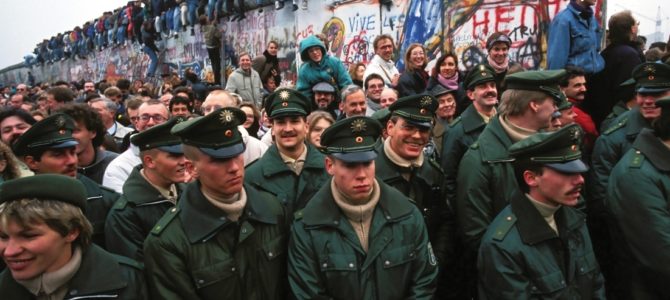
In the summer of 1968, my mother and father, both in their mid 20s, packed one bag each and left a cramped apartment they shared with relatives in Budapest, Hungary, and boarded a train to enjoy a once-in-a-lifetime vacation in Rome.
The process of obtaining permission from authorities to take this holiday — which my parents were enormously fortunate to have received — would strike an American as a bizarrely grueling bureaucratic exercise. But since nearly any effort to secure a “luxury” item in communist Hungary — owning a car or visiting a country with free enterprise or religious freedom, for instance — met a similar shakedown, the process seemed about right to them.
The real trick for my parents was to act eager, but not too eager. What they couldn’t divulge to most who knew them was that they would not return. They would be abandoning all their belongings (modest as they were), secure lifetime jobs, government-provided health care and benefits, everything they knew to defect to a country that they were taught was rife with injustice and depravity. Luckily, decent people never believe their governments.
No, there was no starvation, nor were there death camps in Eastern and Central Europe — at least, not during this iteration of collectivism — yet thousands of people took flight, year after year, sneaking under wires, climbing over walls, hunching down in airplane landing hatches, floating in balloons . . . devising a million creative ways to flee communism.
The most infamous impediment to the free movement of people was the Berlin Wall. Built in 1961, the wall stood for 28 years. It was the symbol of the Soviet Union’s Iron Curtain, trapping millions of people in a tragic socialist experiment. The wall became an emblem of the Cold War, as well, which Daniel Johnson, author of the superb article “Seven Minutes that Shook the World,” called “the first conflict that came close to annihilating Western civilization.”
As a clueless, long-haired, T-shirt-wearing, ungrateful, and jerky teen, I vaguely remember my father grumbling that the communists would never go quietly. In this case, he turned out to be wrong.
On Sept. 11, 1989, as an Associated Press story from the time relays, “thousands of East Germans, crying, laughing and shouting with happiness, poured into Austria from Hungary early today en route to freedom in West Germany . . . .”
The Hungarian government had opened its border with Austria and allowed citizens from other communist nations to leave. This decision triggered a series of events (from 1989 to 1991) that ended a 40-year war that pitted liberal democracies against communist tyrannies. The lack of blood spilled in this victory was, by any historical standard, an anomaly.
The question today is: Do we give this incredible historical achievement the attention it deserves?
This month is the 20th anniversary of the fall of the Berlin Wall, the most lasting image of victory. Matt Welch of Reason magazine recently pointed out that “November 1989 was the most liberating month of arguably the most liberating year in human history, yet two decades later the country that led the Cold War coalition against communism seems less interested than ever in commemorating, let alone processing the lessons from, the collapse of its longtime foe.”
If we haven’t learned any lessons, we’re not alone. Twenty years after the fall of the Berlin Wall, a poll by the Pew Research Center shows that the percentage of people approving of democracy and capitalism in former Warsaw Pact nations is lower today than it was in 1991. The idea of capitalism and democracy, in fact, continues to lose popularity as fewer people feel better off economically under democracy than they did under communism.
Only the Poles (47 percent) and the Czechs (45 percent) — two nations, incidentally, that have embraced Western liberalism — believe that their economic situation is better today than under communism. In the nation my parents had escaped, and I was extremely fortunate not to be born in, 72 percent of Hungarians now say they believe Communism was a better economic system to live under than capitalistic democracy.
I suppose such a poll should make us sad. But in a free society, citizens have a prerogative to ignore history and believe the most foolish ideas imaginable. In this regard, Europeans rarely let us down.
As an American, I certainly don’t find myself romanticizing about the old country, other than being forever grateful that some lazy, pencil-pushing apparatchik granted my parents permission to spend a week in Italia.
After defecting, my parents ended up in New York. Almost anywhere I go these days, I meet defectors from former Soviet satellite nations. (Denver’s local Hungarian community erected the Hungarian Freedom Park in the late ’60s, which commemorates the bravery of those who died in the 1956 Revolution. It was an insurgency that ended much the same way Tiananmen Square did — which is to say very badly.) Most of them seem to have a far stronger bond to United States than to their homelands.
I visited Hungary in 1989 with my parents, who were returning for the first time since they left, to witness the celebration and replacement of a coercive socialist government with a less-odious socialist government. Although perhaps too young to appropriately ponder the historical implications of these events, I still found the entire scene rather anti-climatic.
The West won this fight without shedding blood in Europe. That’s exactly the reason the event doesn’t hold the appropriate significance as one of history’s greatest moments. Some European nations have taken advantage of this great moment, others haven’t. Frankly, it’s difficult to get worked up about the puttering out of a pathetic tyranny built on the pillars of an immoral idea.
It’s easier to say good riddance.
(This article first appeared in the Denver Post on 11.08.2009)









